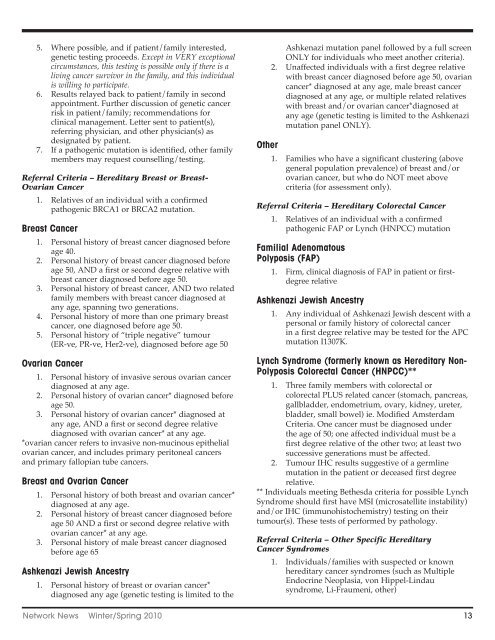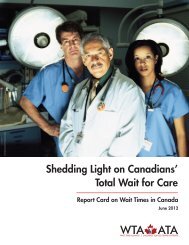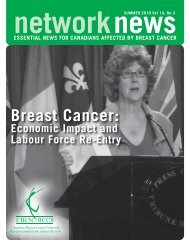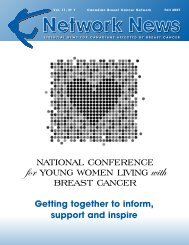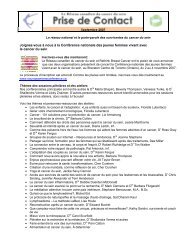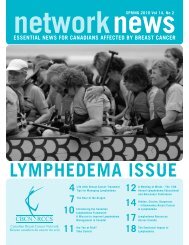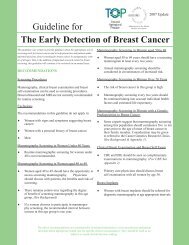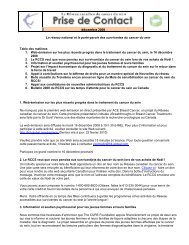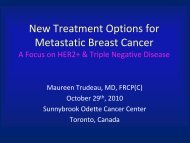Network News - Winter/Spring 2010 - Canadian Breast Cancer ...
Network News - Winter/Spring 2010 - Canadian Breast Cancer ...
Network News - Winter/Spring 2010 - Canadian Breast Cancer ...
You also want an ePaper? Increase the reach of your titles
YUMPU automatically turns print PDFs into web optimized ePapers that Google loves.
5. Where possible, and if patient/family interested,<br />
genetic testing proceeds. Except in VERY exceptional<br />
circumstances, this testing is possible only if there is a<br />
living cancer survivor in the family, and this individual<br />
is willing to participate.<br />
6. Results relayed back to patient/family in second<br />
appointment. Further discussion of genetic cancer<br />
risk in patient/family; recommendations for<br />
clinical management. Letter sent to patient(s),<br />
referring physician, and other physician(s) as<br />
designated by patient.<br />
7. If a pathogenic mutation is identified, other family<br />
members may request counselling/testing.<br />
Referral Criteria – Hereditary <strong>Breast</strong> or <strong>Breast</strong>-<br />
Ovarian <strong>Cancer</strong><br />
1. Relatives of an individual with a confirmed<br />
pathogenic BRCA1 or BRCA2 mutation.<br />
<strong>Breast</strong> <strong>Cancer</strong><br />
1. Personal history of breast cancer diagnosed before<br />
age 40.<br />
2. Personal history of breast cancer diagnosed before<br />
age 50, AND a first or second degree relative with<br />
breast cancer diagnosed before age 50.<br />
3. Personal history of breast cancer, AND two related<br />
family members with breast cancer diagnosed at<br />
any age, spanning two generations.<br />
4. Personal history of more than one primary breast<br />
cancer, one diagnosed before age 50.<br />
5. Personal history of “triple negative” tumour<br />
(ER-ve, PR-ve, Her2-ve), diagnosed before age 50<br />
Ovarian <strong>Cancer</strong><br />
1. Personal history of invasive serous ovarian cancer<br />
diagnosed at any age.<br />
2. Personal history of ovarian cancer* diagnosed before<br />
age 50.<br />
3. Personal history of ovarian cancer* diagnosed at<br />
any age, AND a first or second degree relative<br />
diagnosed with ovarian cancer* at any age.<br />
*ovarian cancer refers to invasive non-mucinous epithelial<br />
ovarian cancer, and includes primary peritoneal cancers<br />
and primary fallopian tube cancers.<br />
<strong>Breast</strong> and Ovarian <strong>Cancer</strong><br />
1. Personal history of both breast and ovarian cancer*<br />
diagnosed at any age.<br />
2. Personal history of breast cancer diagnosed before<br />
age 50 AND a first or second degree relative with<br />
ovarian cancer* at any age.<br />
3. Personal history of male breast cancer diagnosed<br />
before age 65<br />
Ashkenazi Jewish Ancestry<br />
1. Personal history of breast or ovarian cancer*<br />
diagnosed any age (genetic testing is limited to the<br />
Ashkenazi mutation panel followed by a full screen<br />
ONLY for individuals who meet another criteria).<br />
2. Unaffected individuals with a first degree relative<br />
with breast cancer diagnosed before age 50, ovarian<br />
cancer* diagnosed at any age, male breast cancer<br />
diagnosed at any age, or multiple related relatives<br />
with breast and/or ovarian cancer*diagnosed at<br />
any age (genetic testing is limited to the Ashkenazi<br />
mutation panel ONLY).<br />
Other<br />
1. Families who have a significant clustering (above<br />
general population prevalence) of breast and/or<br />
ovarian cancer, but who do NOT meet above<br />
criteria (for assessment only).<br />
Referral Criteria – Hereditary Colorectal <strong>Cancer</strong><br />
1. Relatives of an individual with a confirmed<br />
pathogenic FAP or Lynch (HNPCC) mutation<br />
Familial Adenomatous<br />
Polyposis (FAP)<br />
1. Firm, clinical diagnosis of FAP in patient or firstdegree<br />
relative<br />
Ashkenazi Jewish Ancestry<br />
1. Any individual of Ashkenazi Jewish descent with a<br />
personal or family history of colorectal cancer<br />
in a first degree relative may be tested for the APC<br />
mutation I1307K.<br />
Lynch Syndrome (formerly known as Hereditary Non-<br />
Polyposis Colorectal <strong>Cancer</strong> (HNPCC)**<br />
1. Three family members with colorectal or<br />
colorectal PLUS related cancer (stomach, pancreas,<br />
gallbladder, endometrium, ovary, kidney, ureter,<br />
bladder, small bowel) ie. Modified Amsterdam<br />
Criteria. One cancer must be diagnosed under<br />
the age of 50; one affected individual must be a<br />
first degree relative of the other two; at least two<br />
successive generations must be affected.<br />
2. Tumour IHC results suggestive of a germline<br />
mutation in the patient or deceased first degree<br />
relative.<br />
** Individuals meeting Bethesda criteria for possible Lynch<br />
Syndrome should first have MSI (microsatellite instability)<br />
and/or IHC (immunohistochemistry) testing on their<br />
tumour(s). These tests of performed by pathology.<br />
Referral Criteria – Other Specific Hereditary<br />
<strong>Cancer</strong> Syndromes<br />
1. Individuals/families with suspected or known<br />
hereditary cancer syndromes (such as Multiple<br />
Endocrine Neoplasia, von Hippel-Lindau<br />
syndrome, Li-Fraumeni, other)<br />
<strong>Network</strong> <strong>News</strong> <strong>Winter</strong>/<strong>Spring</strong> <strong>2010</strong> 13


